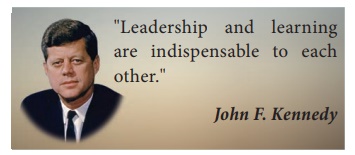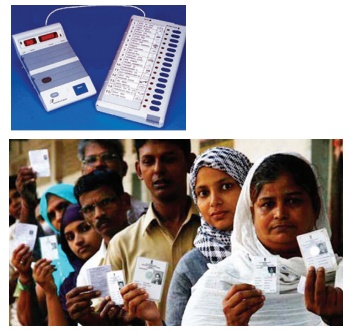Political Science - Role of Political Parties in a Democracy | 11th Political Science : Chapter 9 : Public Opinion and Party System
Chapter: 11th Political Science : Chapter 9 : Public Opinion and Party System
Role of Political Parties in a Democracy
Role of Political Parties in a Democracy
For the effective functioning of a democracy, the existence of political parties that represent conflicting interests is mandatory. While they advocate various interests and policies, largely political parties adopt Rightist ideology (conservative, traditional and capitalistic) or Leftist (pro-equality, liberal and labour interests). While it is true that political parties are essential for attaining the democratic ideal, the rise of individual parties with non-democratic agenda and authoritarian leadership is a critical challenge to Democracy. This is very relevant in the case of a multicultural, multilingual, multi religious and economically diverse country like India, only political parties can truly represent the multidimensional interests of people from every corner of the country. It is vital in a democracy like India that political parties exercise maturity and maintain a secular position, the precious and precarious unity and stability of India cannot be maintained. It is in the interests of the nation, that responsibly and principled parties show a level of maturity and responsibility in exercising their duties and functions for the sustainability of democratic institutions.
Role of Opposition in a Democracy
The relationship between party system and democracy
will be incomplete without the discussion of the role of opposition parties in
democracy. Democracy has no meaning without an effective opposition party or
parties in the country. The nature of democracy is not only determined by the
strength of ruling party alliance but also in the role and functioning of the
opposition party alliance. In fact, the leader of the Opposition party enjoys
the status and privileges of the rank of cabinet minister. A weak opposition
leads to either a government without accountability or the tyranny of the
majority.
Pressure or Interest groups also play an important role in
special issues and events. These are organized groups, having common political
and social interests, which influence decisions from outside. Pressure groups
have voluntary membership and lobby for specific interests. Unlike political
parties, pressure groups do not contest elections. The Pressure Groups are able
to influence the government through various techniques with various public
policy issues and are therefore called pressure groups. Professional pressure
groups may include business interests, trade unions, Farmers, Teachers and Students,
Doctors, culture groups, and institutional groups. Pressure Groups play an
important role in the Indian political system by acting as a link and source of
communication between the masses and the political parties. They sensitize the
public towards vital socio-economic issues and through their lobbying,
influence both the government and the administrative policies.

Psephology
Psephology deals with the study and statistical
analysis of elections and polls. Public opinion polls play an important role in
psephology. They analyze both Opinion Polls and Exit Polls as well as election
results. Opinion Polls and Exit

The main difference between the two is that opinion poll is conducted
before the voter actually votes and the exit poll is conducted after a voter
comes out after casting his or her vote. Results of exit polls are generally
considered to be more trustworthy than that of opinion polls.
The result of opinion polls may or may not actually
collaborate the actual results. Yet they are important in generating opinions
among the unsure and undecided as well as help to sustain a balance in voting
practices for all parties concerned.
Related Topics